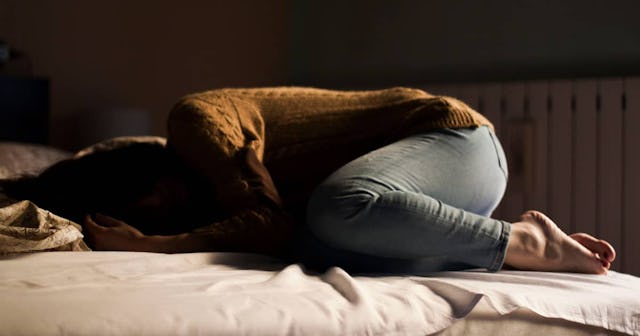'Deaths Of Despair' Are Projected To Spike As A Result Of COVID-19

I don’t want to speak for everyone with mental health concerns, but personally, the coronavirus pandemic has taken a toll on me. A huge one. When my world changed a few weeks ago, I spent most of the time just trying to get my balance. I had to figure out what I should and shouldn’t believe online. Then I assessed the danger. The reality of it all. Then I figured out how to teach my children while working from home. All of it hit me like a wave. It’s only been in the past several weeks that I’ve had a moment to feel.
I’ve lived with pretty nasty anxiety and depression for as long as I can remember, so I suppose I should have the resources and medication to make this all a little more manageable. But like so many people with mental illness in the middle of a pandemic, I’m struggling. And sure, most people are feeling anxiety right now. That’s normal considering the situation. But if you are like me and already have a pre-existing anxiety and depression, this pandemic has only compounded something that’s difficult to live with even under normal circumstances.
So I can’t say I found it particularly shocking when I read a report jointly published last week by the Well Being Trust and the Robert Graham Center for Policy Studies in Family Medicine and Primary Care that estimates that “deaths from despair” (in this case, drug use, alcohol use, and suicide) could increase by 75,000 as a result of COVID-19. Naturally, the report emphasizes that time is of the essence.
The staggering number of deaths was mostly based on data pulled from alcohol and drug misuse and suicide rates after previous natural disasters, such as earthquakes and hurricanes, that often happen in the months after the immediate physical dangers of the disaster have passed. But what is most concerning with COVID-19 is that it isn’t as geographically isolated as an earthquake or a hurricane, but rather a worldwide issue.
The report urges political leaders to begin taking steps now to curve this eventual emotional fallout. But considering the way things are going in the political realm, it is unlikely that steps will be taken — and as someone struggling with my own mental health, I couldn’t help but wonder what steps I should be taking now, not only for myself, but also for my loved ones.
Of course, during a lockdown, the usual avenues of help aren’t exactly there, but that doesn’t mean help isn’t available. NPR recently published a handy list of suggestions for managing your mental health that can be utilized right now, and I personally have been using many of them to keep my head straight.
Connect Online
See friends and family by Zoom or phone. Feeling understood and sharing feelings of pain can help alleviate your personal struggle. And I must admit, I have been calling more friends and family than ever, and it just feels good to talk to someone over the phone.
Adjust Your Medications If Necessary And Seek Out Teletherapy
Many psychotherapists and health plans are offering telehealth visits during this time. I’ve been meeting with my therapist this way. I have an online appointment with my psychologist soon to reassess my medications. If you have never met with your therapist online, I will say it takes some getting used to. It can also be difficult to find a place in your house where you can speak candidly with your therapist — especially right now, when every single member of your household is always home. I’m not a huge fan of trying to talk about my fears and anxieties with my family listening, so I try not to meet with him at the kitchen table. But with enough planning, it’s doable. However, be sure to check with your insurance provider to see if they have any hang-ups about covering online meetings.
Make A Safety Plan
This suggestion is one I haven’t tried, but should. This is where you sit down with family members or friends, preferably someone you live with, and draw out a plan for when you are in crisis. This includes locking up any guns or other objects that can be used for self-harm. Now listen, I know this can be a dark conversation, but with all the uncertainty going on right now, it’s one that really ought to happen before there is a tragedy. There are even a number of wonderful online templates that can be used to draw up a safety plan, adding a level of formality to what could be an emotional conversation.
Seek Financial Help
This might be the most important, considering that so much of what we will all be struggling with in the coming months, or even years, is a financial burden that can lead to increased depression. Here is a really handy overview from NPR that lists out all the ways people struggling financially due to COVID-19 can find help.
Listen, 75,000 people dying because of despair is not cool, okay? I’ll just say it. If you are struggling with anxiety or depression right now, I hope it comforts you to know that I, along with a lot of others, are right there with you. Please realize that there is still help around you, even if the method of obtaining it looks a little different than usual due to our current circumstances. And if you know someone else who struggles on a regular day, check in on them. They need you now more than ever.
This article was originally published on